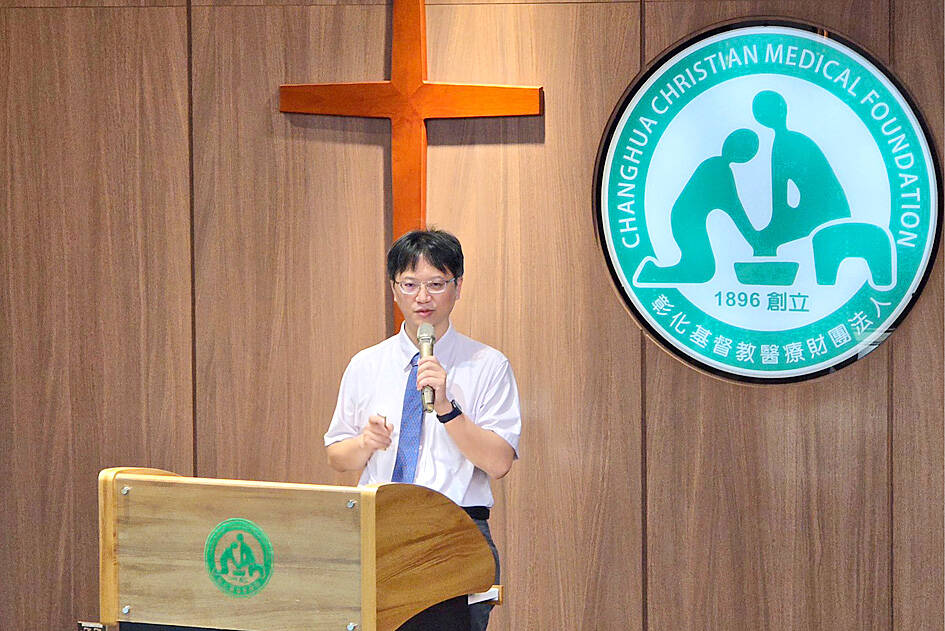China’s organ transplant industry is a systemic human rights crisis and Taiwanese going to China for transplants pay far more than Chinese, a doctor said on Friday.
The Chinese organ transplant system is built on human rights abuses, previously relying heavily on death row inmates, Uighur prisoners of conscience, Christians and priests as sources of organs, Taiwan Association for International Care of Organ Transplants vice president Huang Shi-wei (黃士維) said in a speech on overseas organ transplantation’s development and ethical issues at the Changhua Christian Hospital in Changhua City.
In the past few years, more socially disadvantaged people have become subject to the opaque, unethical black market for organs in the name of “citizen donation,” Huang said.

Photo courtesy of the Changhua Christian Hospital
It is “not medical treatment, but an industry selling people as commodities,” he said.
Taiwanese visiting China to undergo an organ transplant are not only charged much more than locals, but became an accessory to human rights abuse, he said.
From 2000 to 2006, Taiwanese who traveled to China for kidney or liver transplants were charged NT$900,000 to NT$2 million (US$30,065 to US$66,811), much higher than the NT$180,000 to NT$250,000 it would cost Chinese, Huang said.
The fees have soared since 2007 to more than NT$2 million for a kidney transplant and up to NT$8 million for a liver transplant, he said.
“Some agents claimed they offered ‘premium services’ such as providing the company of doctors throughout therapy or a ‘personalized healthcare team,’ but in reality, they exploit the opportunity to charge millions of dollars more,” Huang said.
The Physicians Act (醫師法) and the Human Organ Transplantation Act (人體器官移植條例) stipulate that doctors could face having their license revoked if they engage in organ trade or broker organ transplantation.
However, the value chain is covert and so incredibly profitable that there are black market operators in Taiwan, Huang said.
“Chinese hospitals are searching for organs by any means and people there are living in fear,” he said, adding that the medical issue of organ transplantation has evolved into “a systemic human rights crisis.”
Patients who were deceived into believing that they can buy a happy life would find themselves taking a gamble, Huang said.
Hospital spokesman Chang Shang-wen (張尚文) said that doctors accompanying people to China for an organ transplant would be betraying patients’ trust in the healthcare system as well as violate the medical code of ethics.
People are not required to travel abroad for organ transplants, as the quality of living-donor liver transplants in Taiwan meets international standards and the nation has a high success rate, he said.
“Healthcare is not a dark industry and medical practitioners’ conscience is the last line of defense,” Chang added.

A strong continental cold air mass is to bring pollutants to Taiwan from tomorrow, the Ministry of Environment said today, as it issued an “orange” air quality alert for most of the country. All of Taiwan except for Hualien and Taitung counties is to be under an “orange” air quality alert tomorrow, indicating air quality that is unhealthy for sensitive groups. In China, areas from Shandong to Shanghai have been enveloped in haze since Saturday, the ministry said in a news release. Yesterday, hourly concentrations of PM2.5 in these areas ranged from 65 to 160 micrograms per cubic meter (mg/m³), and pollutants were

Taiwan’s armed forces have established response protocols for a wide range of sudden contingencies, including the “Wan Chun Plan” to protect the head of state, the Ministry of Defense (MND) said today. After US President Donald Trump on Saturday launched a series of airstrikes in Venezuela and kidnapped Venezuelan President Nicolas Maduro, concerns have been raised as to whether China would launch a similar “decapitation strike” on Taiwan. The armed forces regularly coordinate with relevant agencies and practice drills to ensure preparedness for a wide range of scenarios, Vice Minister of National Defense Hsu Szu-chien (徐斯儉) told reporters before a

EVA Airways on Saturday said that it had suspended a pilot and opened an investigation after he allegedly lost his temper and punched the first officer several times as their plane was taxiing before takeoff at Los Angeles International Airport. According to a report published on Thursday by The Reporter, the incident occurred after the flight’s Malaysian first officer tried to warn the Taiwanese pilot, surnamed Wen (文), that he was taxiing faster than the speed limit of 30 knots (55.6kph). After alerting the pilot several times without response, the first officer manually applied the brakes in accordance with standard operating

Japanese Councilor Hei Seki (石平) on Wednesday said that he plans to visit Taiwan, saying that would “prove that Taiwan is an independent country and does not belong to China.” Seki, a member of the Japan Innovation Party, was born in Chengdu in China’s Sichuan Province and became a naturalized Japanese in 2007. He was elected to the House of Concilors last year. His views on the Chinese Communist Party (CCP) — espoused in a series of books on politics and history — prompted Beijing to sanction him, including barring Seki from traveling to China. Seki wrote on X that he intends